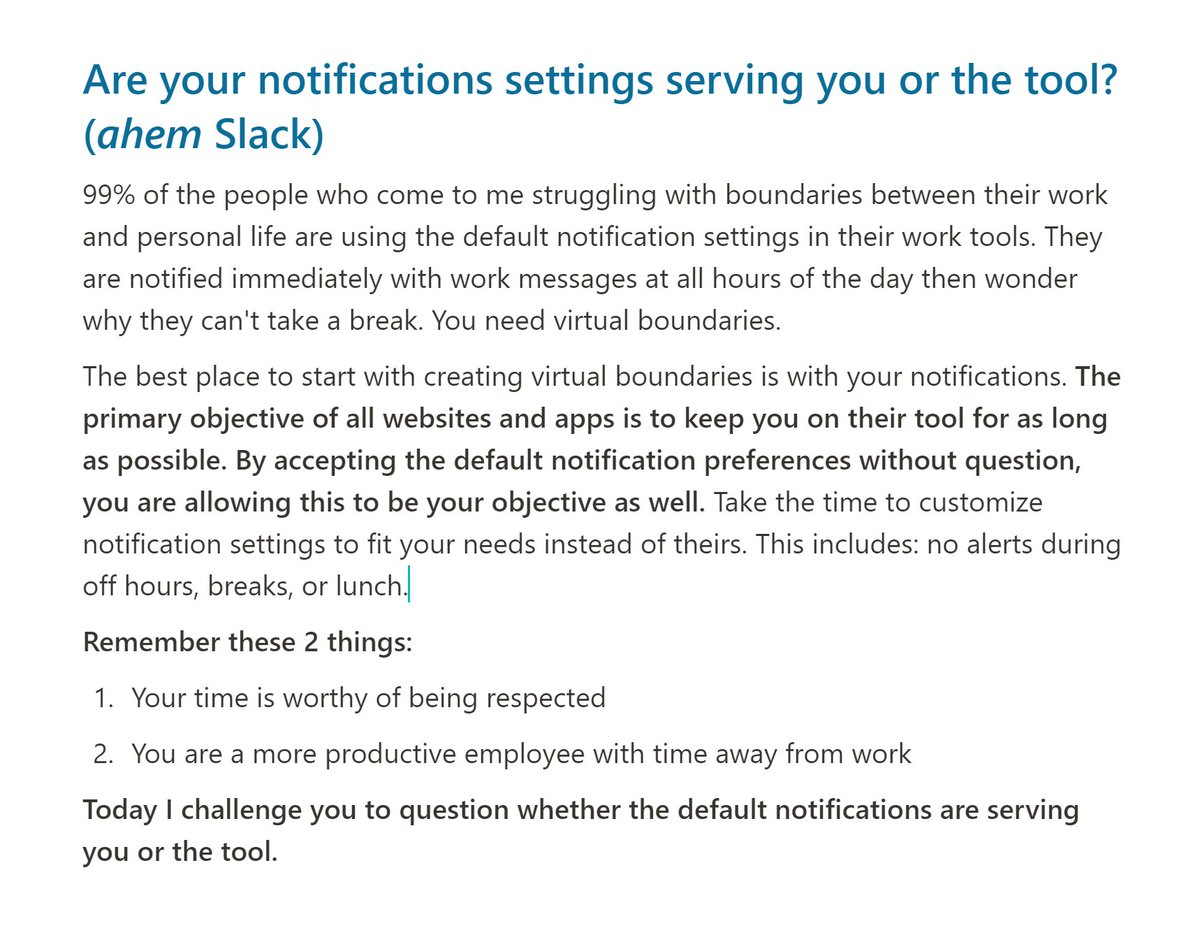
How much of your workweek is spent in meetings?
Despite juggling a Head of Product role while also running my own company on the side, I only spend about 5% of my workweek in meetings.
But it wasn't always this way. Here's how to stop wasting time in endless meetings ⬇️
Despite juggling a Head of Product role while also running my own company on the side, I only spend about 5% of my workweek in meetings.
But it wasn't always this way. Here's how to stop wasting time in endless meetings ⬇️
Early on, I spent 80% of my workweek in meetings.
I defaulted to synchronous mode which left me in a constant reactive state. At the end of the day, I was always exhausted yet didn't feel like I had made any progress.
Both my work and mental health were suffering.
I defaulted to synchronous mode which left me in a constant reactive state. At the end of the day, I was always exhausted yet didn't feel like I had made any progress.
Both my work and mental health were suffering.
The primary goal of my role is to make informed decisions.
I can't succeed at this if I'm constantly interrupted leaving no room for deep work.
So I switched to a new approach that allows me to get more done, have a happier team, and feel much better.
Here's what worked:
I can't succeed at this if I'm constantly interrupted leaving no room for deep work.
So I switched to a new approach that allows me to get more done, have a happier team, and feel much better.
Here's what worked:
1. Implement best meeting practices
• Have clear meeting goals - If the objective isn't clear, cancel the meeting
• Start the call with the agenda - Have a clear purpose and scope
• Don't max out the time - Scheduled for 30 min, doesn't mean it needs to take 30 min.
• Have clear meeting goals - If the objective isn't clear, cancel the meeting
• Start the call with the agenda - Have a clear purpose and scope
• Don't max out the time - Scheduled for 30 min, doesn't mean it needs to take 30 min.
• End the call with a summary & next steps - Make clear what was decided, next action steps, and who is responsible for them
• Don't set recurring calls without an end date - Evaluate regularly if the meeting is still needed, has the right format, and requires the same people
• Don't set recurring calls without an end date - Evaluate regularly if the meeting is still needed, has the right format, and requires the same people
2. Follow a meeting framework
Instead of accepting every single meeting invite, have a set of rules to define what to say yes to.
Ex. I will only accept x meetings per day, during y hours, and only after determining if it is in the best format.
Instead of accepting every single meeting invite, have a set of rules to define what to say yes to.
Ex. I will only accept x meetings per day, during y hours, and only after determining if it is in the best format.
Framework details to include:
• Days you'll accept meetings
• Criteria required to accept (ex. agenda)
• How many meetings you'll accept per day
• Meeting length
• Instant no hours (lunch, deep work time, etc)
Make the rules now instead of leaving the decision up to later.
• Days you'll accept meetings
• Criteria required to accept (ex. agenda)
• How many meetings you'll accept per day
• Meeting length
• Instant no hours (lunch, deep work time, etc)
Make the rules now instead of leaving the decision up to later.
3. Embrace asynchronous communication
Constant synchronous communication is exhausting. You're in this endless loop of reacting and responding. This leaves no time for thinking or being proactive.
Start with these baby steps:
Constant synchronous communication is exhausting. You're in this endless loop of reacting and responding. This leaves no time for thinking or being proactive.
Start with these baby steps:
• Create a repeatable resource for repeated questions by recording your response with @loom. Start an 'FAQ' doc and link answers.
• Don't let your notifications drive your workday. Set synchronous work hours to check Slack, email, etc. Mute your notifications all other hours.
• Don't let your notifications drive your workday. Set synchronous work hours to check Slack, email, etc. Mute your notifications all other hours.
Having meetings only 5% of the workweek may be too little (or too much!) for you, and that's okay. This isn't about the specific value.
This is about using your time more intentionally.
Imagine what you could accomplish with a little space to think.
This is about using your time more intentionally.
Imagine what you could accomplish with a little space to think.
A detailed version of this was originally published in my newsletter, Remotely Interesting.
Subscribe here to explore better ways to live and work:
subscribe.marissagoldberg.com
Subscribe here to explore better ways to live and work:
subscribe.marissagoldberg.com
Remember:
The current default is to fit deep work around your meeting schedule.
This constant reactive state isn't healthy or good for your work.
Reverse this approach to create a calm work environment without constant Zoom fatigue.
Give yourself space to think.
The current default is to fit deep work around your meeting schedule.
This constant reactive state isn't healthy or good for your work.
Reverse this approach to create a calm work environment without constant Zoom fatigue.
Give yourself space to think.
• • •
Missing some Tweet in this thread? You can try to
force a refresh









